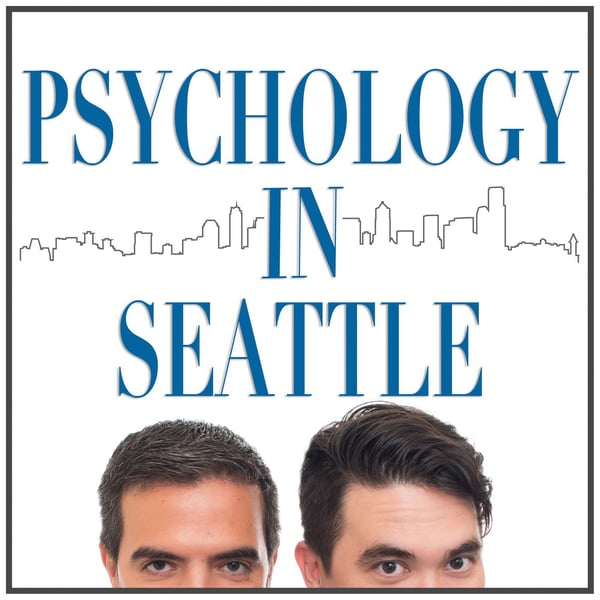Emotion and Attachment Emails
Psychology In Seattle Podcast
Kirk Honda
4.6 • 1.2K Ratings
🗓️ 3 May 2021
⏱️ 65 minutes
🧾️ Download transcript
Summary
Become a patron: https://www.patreon.com/PsychologyInSeattle
Email: https://www.psychologyinseattle.com/contact
Get merch: https://teespring.com/stores/psychology-in-seattle
Dr. Kirk’s Cameo: https://www.cameo.com/kirkhonda
Instagram: https://www.instagram.com/psychologyinseattle/
Discord: https://discord.gg/6QR4sE8x9K
Reddit: https://www.reddit.com/r/PsychologyInSeattle/
Twitter: https://twitter.com/PsychInSeattle
Facebook Official Page: https://www.facebook.com/PsychologyInSeattle/
Facebook Fan Page (run by fans): https://www.facebook.com/groups/112633189213033
The Psychology In Seattle Podcast ®
Trigger Warning: This episode may include topics such as assault, trauma, and discrimination. If necessary, listeners are encouraged to refrain from listening and care for their safety and well-being.
Disclaimer: The content provided is for educational, informational, and entertainment purposes only. Nothing here constitutes personal or professional consultation, therapy, diagnosis, or creates a counselor-client relationship. Topics discussed may generate differing points of view. If you participate (by being a guest, submitting a question, or commenting) you must do so with the knowledge that we cannot control reactions or responses from others, which may not agree with you or feel unfair. Your participation on this site is at your own risk, accepting full responsibility for any liability or harm that may result. Anything you write here may be used for discussion or endorsement of the podcast. Opinions and views expressed by the host and guest hosts are personal views. Although, we take precautions and fact check, they should not be considered facts and the opinions may change. Opinions posted by participants (such as comments) are not those of the hosts. Readers should not rely on any information found here and should perform due diligence before taking any action. For a more extensive description of factors for you to consider, please see www.psychologyinseattle.com
This show is part of the Spreaker Prime Network, if you are interested in advertising on this podcast, contact us at https://www.spreaker.com/show/3269717/advertisement
Transcript
Click on a timestamp to play from that location
| 0:00.0 | Hey, deserving listeners. It's just me today. I thought I would answer patron emails. I got a lot of emails about seasonal |
| 0:06.2 | effective disorder or SAD or sad. |
| 0:09.6 | There is a lot of BS on the internet and so let me clear up some of that. I actually spent |
| 0:15.9 | a portion of my early career specializing in this. I gave talks on it. I don't know why, maybe because Seattle, not sure. |
| 0:24.4 | First off, there's a huge difference between having a disorder like major depressive disorder or bipolar. |
| 0:32.0 | There's a huge difference between having a disorder in the DSM and feeling a little down during the winter months. |
| 0:39.0 | A lot of people online will say, oh my god, I have seasonal effective disorder and it's possible that you do, |
| 0:45.6 | but it's also possible that you're just feeling a little down or you just don't like the winter months |
| 0:51.1 | because you can't spend time outside or something. That is a far cry from actually suffering from a |
| 0:57.0 | disorder. People who suffer from actual diagnosable major depressive disorder that has a seasonal |
| 1:04.6 | aspect to it. These people are often suicidal on a daily basis. They can't get out of bed. |
| 1:12.1 | They hate themselves. They think they're a burden on society. They don't take pleasure in anything |
| 1:19.6 | for months and months of months. They might cry all the time. They might have no emotion. |
| 1:24.4 | It's a pretty severe thing. Major depression is a very severe thing. Unless you've actually |
| 1:29.7 | experienced it or known someone that's gone through it or had a client that has gone through it, |
| 1:33.6 | you really, it's hard to know exactly what it's like because people talk about depression |
| 1:41.3 | in common language as this mild thing. It can be mild, but for those who are diagnosed with it, |
| 1:49.2 | it's a very severe thing. The other thing is that regarding seasonal affective disorder, |
| 1:54.8 | what we use in the language of the DSM is we will say a mood disorder like major depressive disorder |
| 2:00.8 | with a seasonal pattern. That's what we will say. It's important to note that this clarifier |
| 2:07.9 | doesn't designate winter. We have people who suffer from major depressive disorder and it will |
| 2:14.8 | cycle into a more severe form in the summer. Sometimes it's a winter, sometimes it's not, |
... |
Please login to see the full transcript.
Disclaimer: The podcast and artwork embedded on this page are from Kirk Honda, and are the property of its owner and not affiliated with or endorsed by Tapesearch.
Generated transcripts are the property of Kirk Honda and are distributed freely under the Fair Use doctrine. Transcripts generated by Tapesearch are not guaranteed to be accurate.
Copyright © Tapesearch 2025.

